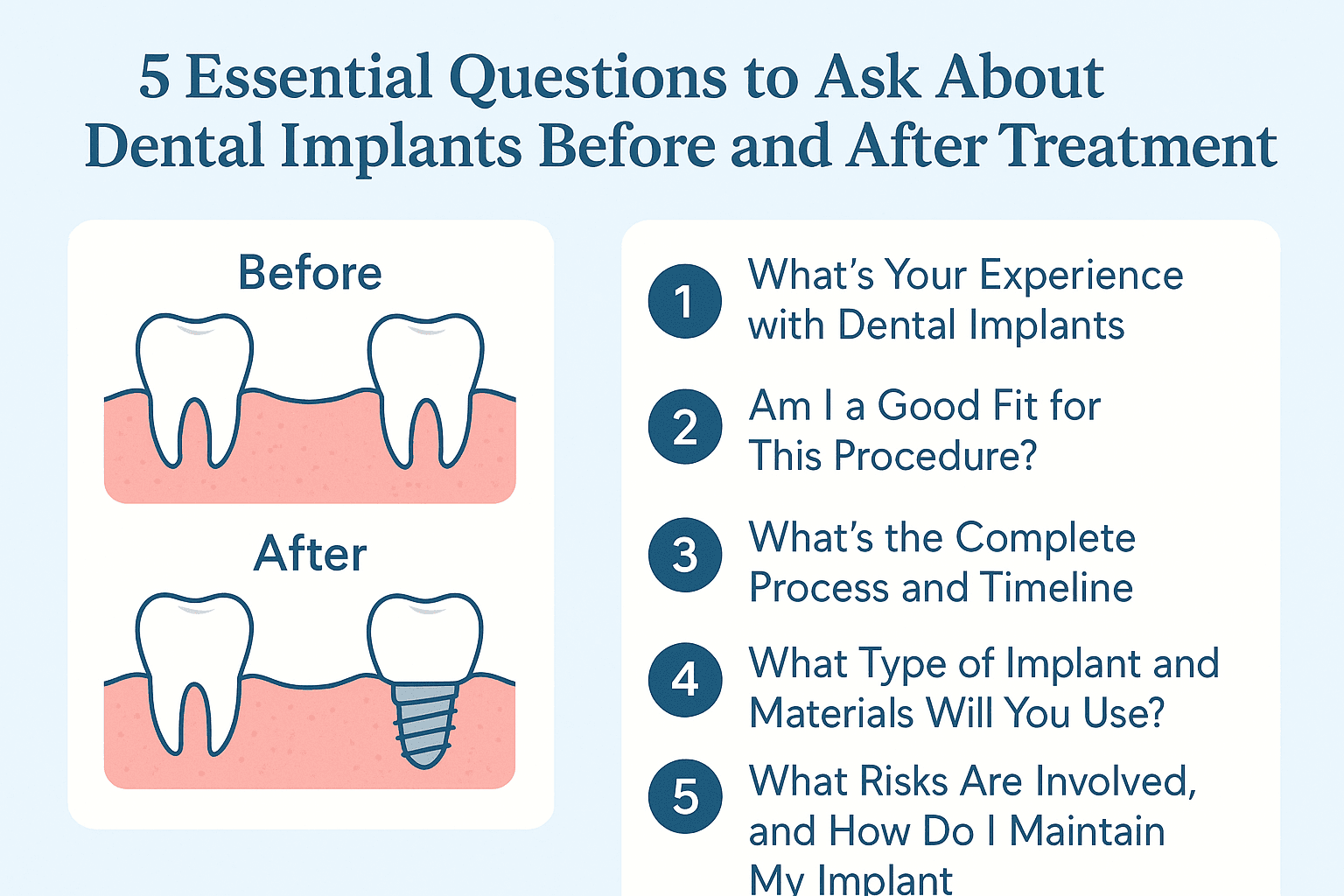5 Essential Questions to Ask About Dental Implants Before and After Treatment

If you’re considering dental implants to restore your smile, you’re not alone. Millions of people choose implants every year because they offer a permanent, natural-looking solution to missing teeth. But while the results—often showcased in stunning dental implants before and after photos—can be life-changing, the process is complex and requires a commitment—both physically and financially.
Before taking the plunge, it’s crucial to ask the right questions. Doing so ensures that you're making an informed decision with a full understanding of the procedure, risks, and expected outcomes. Here are five essential questions to ask your dentist before getting dental implants.
1. What’s Your Experience with Dental Implants?
When it comes to implant surgery, your dentist’s experience plays a huge role in the success of the procedure. Ask them:
How many implant procedures have they completed?
What is their success rate?
Do they specialize in implants or perform them occasionally?
Do you offer any warranty or long-term support for the implant?
An experienced implantologist will not only have technical precision but will also be adept at handling complications, if any occur. You want someone who’s confident, competent, and well-versed in the latest implant techniques.
Pro Tip: Look for certifications from recognized dental implant associations and ask to see dental implant photos or dental implants before and after pictures to assess their work.
At Dezy, we offer a lifetime warranty on our dental implants, providing long-term assurance and peace of mind to our patients.
2. Am I a Good Fit for This Procedure?
Dental implants aren’t one-size-fits-all. Your suitability depends on several factors including:
- Jawbone density: A strong jawbone is crucial to anchor the implant securely.
Gum health: Healthy gums reduce the risk of infection and ensure better healing.
Medical history: Conditions like diabetes, osteoporosis, or smoking habits can affect healing and implant success.
If your jawbone isn’t thick enough, your dentist may suggest bone grafting before proceeding with the implant. Understanding your eligibility early helps you mentally and financially prepare for any additional steps.
Tip: Whether you’re looking at a front tooth implant before and after results or full-mouth restorations, knowing your eligibility helps set realistic expectations.
3. What’s the Complete Process and Timeline?
Implant treatment is not a one-day affair. It involves multiple stages that can span several months. Here's a general timeline:
Initial consultation & imaging (X-rays or 3D scans)
Preparatory procedures (if needed), like extractions or bone grafting
Implant placement surgery
Healing period (osseointegration), which can take 3–6 months
Abutment and crown placement
Make sure you understand:
How many appointments are required
Estimated healing time at each stage
When you can expect to have a fully functioning tooth
Planning for your teeth surgery before and after timeline is especially important if you’re considering a smile makeover around a big life event.
4. What Type of Implant and Materials Will You Use?
All implants are not created equal. The type of implant and materials used affect not only the durability and function but also the cost and aesthetics.
At Dezy, we use high-quality implant systems like Osteem, known for their precision engineering, long-term success rates, and superior biocompatibility.
Key materials include:
Titanium implants: The most common and well-researched, known for their durability and biocompatibility.
Zirconia implants: A metal-free alternative, ideal for patients with allergies or those seeking a more holistic option.
For the crown (the visible tooth part), options range from porcelain fused to metal (PFM) to zirconia and ceramic. Each comes with pros and cons in terms of appearance, strength, and wear.
Ask your dentist:
Why a particular type is being recommended for you
The brand and longevity of the implant system being used
How the materials affect aesthetics and durability
Whether you're reviewing dental implants front teeth before and after or all four dental implants before and after cases, the materials used play a significant role in the final look and function.
5. What Risks Are Involved, and How Do I Maintain My Implant?
While dental implants have a high success rate (above 95% in most cases), they are not entirely risk-free. Potential complications include:
Infection at the implant site:
Nerve damage
Implant rejection or failure due to poor bone integration
Sinus issues (for upper jaw implants)
Ask your dentist:
What are the short- and long-term risks?
How do they handle complications if they occur?
What aftercare routine should you follow?
Your dentist should provide a detailed maintenance plan, including brushing and flossing techniques, special cleaning tools, and the frequency of follow-up visits.
Consistent aftercare is especially important for long-term results, whether it’s a front tooth implant before and after or full dental implants before and after transformation.
Why These Questions Matter
Asking the right questions isn’t about second-guessing your dentist—it’s about becoming an informed patient. Understanding the full picture helps you:
Make confident, clear decisions
Plan for costs and timelines
Avoid surprises
Ensure a successful outcome
Implants are a long-term investment in your oral health. Taking the time to ask these questions builds trust with your dental provider and sets the stage for a smooth, satisfying smile transformation.
Ready to begin your journey? Explore all 4 dental implants before and after, teeth implants before and after, and dental implants images before and after to see what’s possible with modern implant dentistry.

